Plant-rich diets are more environmentally friendly [study summary]
Where we get our foods from and what we choose to eat is making a much larger environmental impact that most of us are probably aware of.

With the global population growth not slowing down anytime soon, the environmental cost of the foods and animals that the billions of us choose to eat should be carefully considered. Therefore, identifying and promoting diets that are the most environmentally sustainable is extremely important.

Not only are there substantial environmental costs - things like land and biodiversity degradation, huge amounts of water use, air pollution - but there are also massive financial operating costs needed for the relentless amounts of electricity, feed, fertiliser used during production.
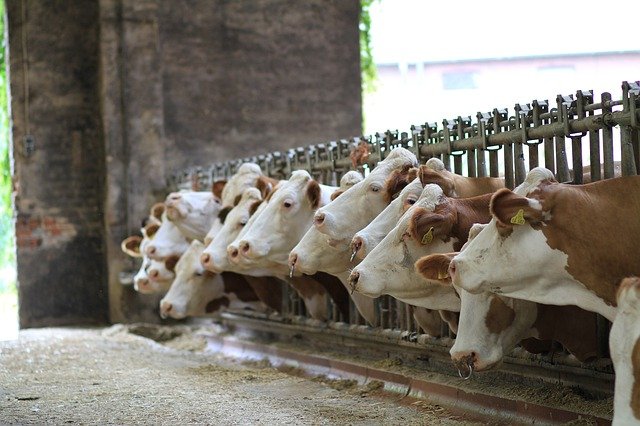
A recent study analysed data from over 34,000 French participants in order to determine the level of environmental impact from their chosen diets.
People in the study were split into 5 groups (quintiles; Q1 - Q5) based on how much of their diet consisted of plant-based foods. Those that ate the most animal-products (and therefore, the least amount of plant foods) were grouped into Q1 - and those consuming the most plants (closer to a vegetarian or vegan diet) were in Q5.

Results from the study revealed that there is a linear relationship between all measures of environmental impact (amount of daily greenhouse gas emissions and amount of energy and land required for production) and consumption of animal products (i.e. plant-based diets are more environmentally friendly.
Greenhouse gas emissions

(Mean data in graph above is taken from study)
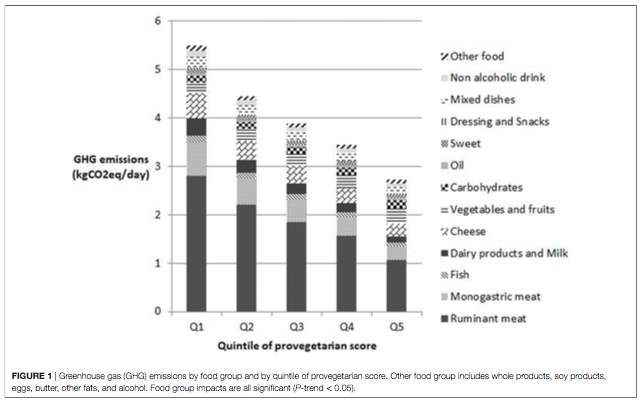
Image source
The greenhouse gas emissions from heavy meat-eaters (Q1) was more than double that of the mostly plant-eaters (Q5) - with the major contributor across all groups being ruminant meat (cattle, sheep, goats, buffalo and game).
Cumulative energy demand
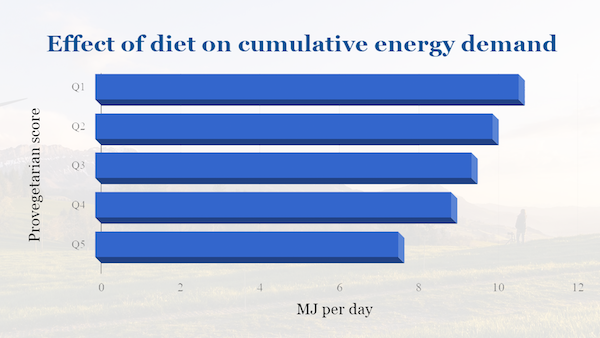
(Mean data in graph above is taken from study)
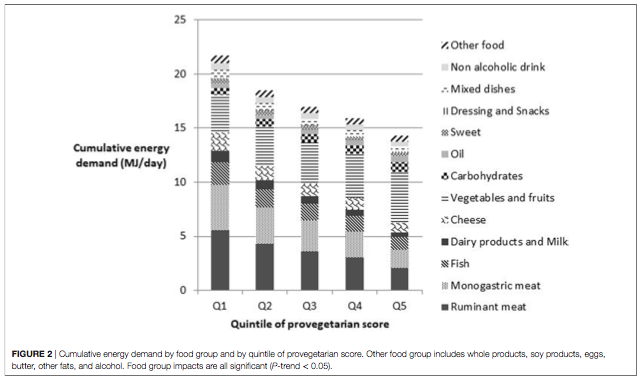
Image source
The amount of energy needed to produce certain food types is also important to consider when assessing environmental impact. This study found that plant-rich diets also reduced the cumulative energy demand as ruminant and monogastric meats required the most daily energy input.
Cumulative energy demand (CED) was measured as megajoules (MJ)/day.
Megajoule = 1 000 000 Joules (1000 kJ)
Land occupation
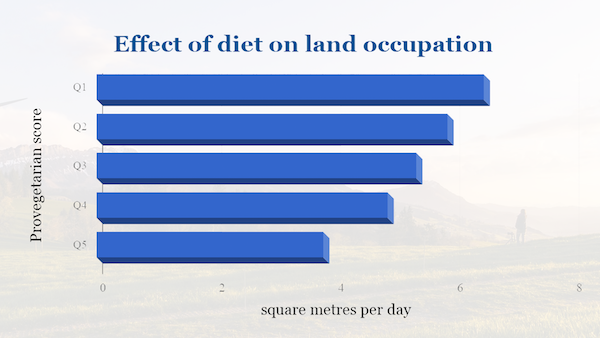
(Mean data in graph above is taken from study)
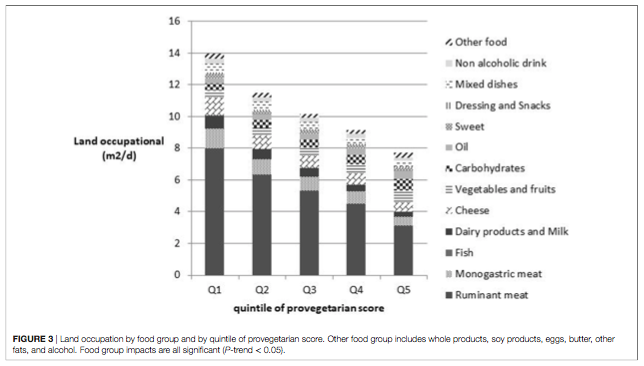
Image source
Likewise, diets containing the most animal-based products require the most amount of land - as livestock needs dramatically more land for production.
Read the full article here
Lacour, C, Seconda, L, Allès, B, Hercberg, S, Langevin, B, Pointereau, P, Lairon, D, Baudry, J & Kesse-Guyot, E (2018), 'Environmental Impacts of Plant-Based Diets: How Does Organic Food Consumption Contribute to Environmental Sustainability', Frontiers In Nutrition, vol.8, no.8
Images are my own, sourced from Pixabay or linked
My Latest Posts
Savour the flavour: Why Japanese diets and the taste of umami are so good for your health 🍚
I lost 35% of my crypto investments in the FIRST MONTH!! 😱
Student stress and weight gain
Can Diets Tailored To Our Genetics Help With Weight Loss?
#JustOne Orange Provides You With…
Printable Diets: How Soon Will We Have 3D Foods?
My Latest Recipes
Smoky Miso Tempeh Marinade | Vegan
10 Tasty Vegan Meals | Instagram Deep Dive
Toasted Avocado and Enoki Mushroom Sandwich | My Favourite Vegan Lunch
CONNECT WITH ME ON

It is great that you are raising awareness. A plant-based diet is definitely more environmentally friendly. Just think about it: we are producing billions of tons of soy, corn and grains just to feed the animals. We have to use so much more water (and in many countries water is limited) just to produce these enormous amounts of food that humans CAN eat but don't want to. If animal-based food products were less popular, we could save so much energy, water and consequently also reduce the CO2 emissions.
Great article and great resources. :) Thanks for sharing.
Nice man, great to get the highlights of the study, sometimes the study's can be quite difficult to digest but this spells it out clearly. 😎
Thanks man, I think I should do a lot more like this - it makes the studies a little more palatable for those unfamiliar with scientific writing
Oh for sure man, a lot of people just get that deer in headlights look when it comes to studies even the abstracts are too much for some. This is very readable. Good stuff.
Hi @thedrewtrott. I forgot you were another Aussie vegan. There is a new vegan discord server to connect with other vegans on steemit. It's fun. And growing. You should join. https://discord.gg/K9SyfkD
I always thought a plant-based diet is more environmentally friendly. 🌱 It's great to see some concrete evidence backing it up. Great post! 👌
In as much as i agree with u, but i think plants and animal foods offer different advantages and disadvantages you need to be aware of to balance your diet properly.
Yes, Plant-rich diets are more environmentally friendly and healthy for us. So, adopting a vegan lifestyle very good to promote this. Like your post.
This post has received a 18.52 % upvote from @chronocrypto thanks to: @thedrewtrott.
You got a 35.71% upvote from @luckyvotes courtesy of @thedrewtrott!
You got a 16.50% upvote from @minnowvotes courtesy of @thedrewtrott!
It is important to know a strict plant-based diet can prevent you from getting enough protein, especially that the protein found in plant-based foods are incomplete. Your body requires a certain balance between all the essential and non-essential amino acids. Remember, the protein found in most plants are incomplete and may cause malnutrition in some people.
If it is a very poorly put together and considered vegan diet then you may be deficient in some amino acids which could affect protein synthesis, however, including a large variety of grains, vegetables, nuts, seeds, legumes and beans (which is the type of diet I believe most vegans adhere to) will provide more than enough protein.
Where did you get that plant protein is incomplete? As far as I know, plant protein is totally sufficient for a healthy diet. Besides, even with a vegan diet you can get ALL essential and non-esentail amino acids and vitamins. You just need to have thoughtful diet plan.